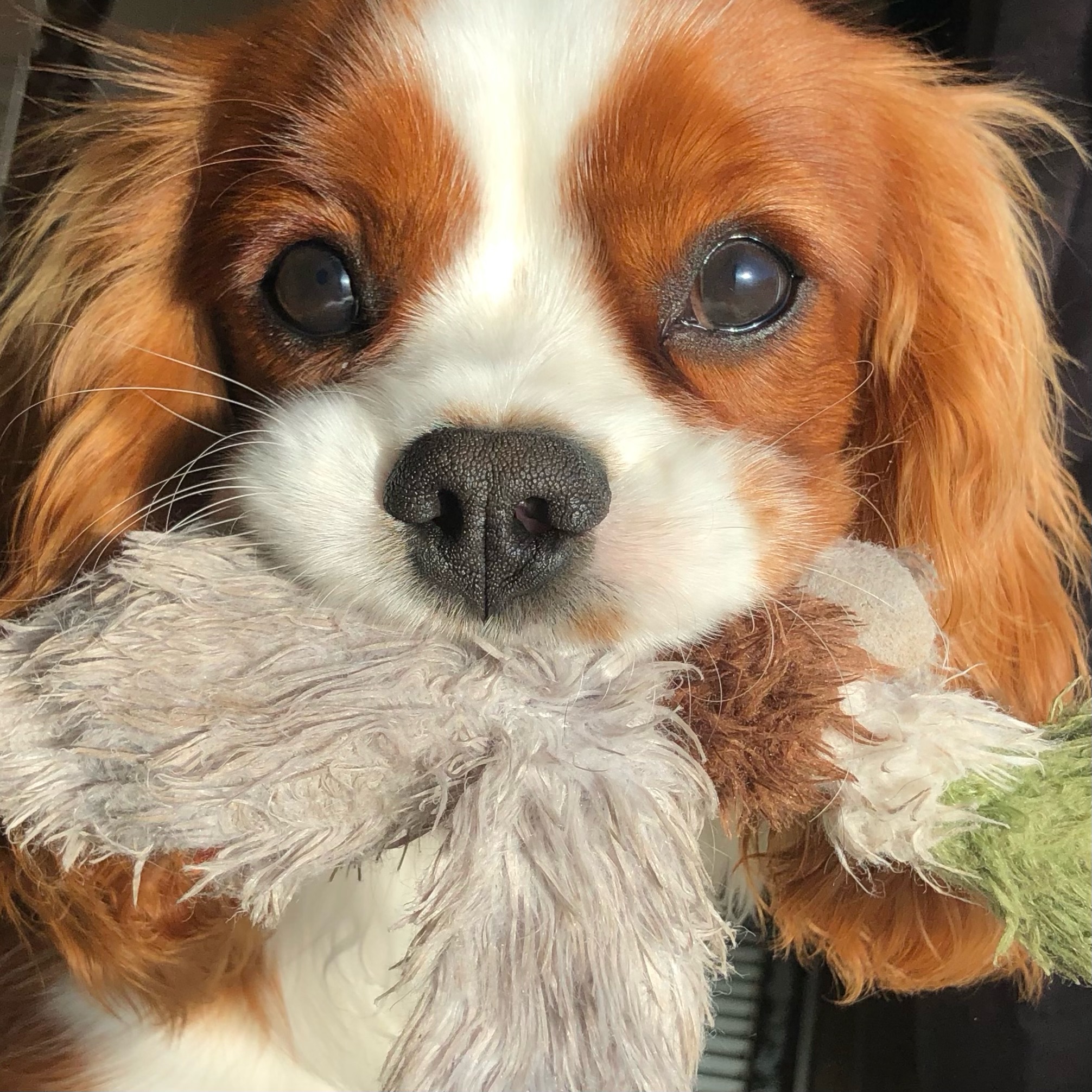Breed Info
The Cavalier King Charles Spaniel wears his connection to British history in his breed’s name. Cavaliers are the best of two worlds, combining the gentle attentiveness of a toy breed with the verve and athleticism of a sporting spaniel. The Cavalier’s all-around beauty, regal grace, and even temper mark him as one of dogdom’s noblemen. A toy spaniel no more than 13 inches high, the Cavalier draws you in with his face: The sweet, gentle, melting expression emanating from large, round eyes is a breed hallmark. Another is the silky, richly colored coat that can be one of four distinct varieties (described in this page’s History section). Cavaliers may be aristocrats, but they gladly descend from their royal high horse for a backyard frolic or a squirrel chase. They get along nicely with children and other dogs. Adaptable Cavaliers do equally well with active owners and homebodies; they can be upbeat athletes or shameless couch potatoes, depending on an owner’s lifestyle.
–AKC

Personality & Expectations
Cavaliers are renowned for their affectionate and friendly nature. They’re true companions, always ready to shower their families with love and warmth. These dogs thrive on human interaction, making them fantastic for families, singles, and seniors alike. Their gentle demeanor and adaptable personality make them great for both city and country living.
Expectations:
Affectionate Companionship: Cavaliers are known for their strong bond with their owners. Expect a furry friend who loves to snuggle and be a part of your daily activities.
Playful Energy: Despite their royal appearance, Cavaliers are playful and energetic. Regular play and walks are essential to keep them happy and healthy.
Sociable Nature: These social butterflies get along well with children, other pets, and even strangers. They make excellent therapy dogs due to their friendly disposition.
General health
Cavalier King Charles Spaniels are generally healthy dogs, but like any breed, they can be prone to certain health issues. One common concern is mitral valve disease (MVD), a heart condition that may affect Cavaliers, highlighting the importance of regular veterinary check-ups and cardiac screenings. Additionally, they can be susceptible to syringomyelia (SM), a condition involving cysts near the brain and spinal cord. Responsible breeding practices, including MRI screenings, aim to minimize this risk. Cavaliers may also be prone to hip dysplasia, and maintaining a healthy lifestyle with a balanced diet and regular exercise can contribute to joint health. Regular grooming, particularly ear care, is crucial to prevent infections. While these dogs generally have a lifespan of 10 to 14 years, individual health can vary, making it essential to stay vigilant and consult with a vet for personalized care.
Care and feeding
To ensure your Cavalier King Charles Spaniel’s well-being, maintain a regular grooming routine, brushing their luxurious coat and paying extra attention to their ears to prevent infections. Schedule routine veterinary check-ups to monitor their overall health and address any potential issues proactively. Keep them active with at least 30 minutes to an hour of daily exercise, combining walks, playtime, and mental stimulation. As social butterflies, Cavaliers thrive on interactions, so expose them to various environments, people, and other dogs for a well-rounded socialization experience.
Health Testing!!
The health and happiness of our Cavaliers are at the heart of everything we do. We take pride in going the extra mile to ensure that each of our cavaliers undergo thorough health testing. It’s not just a practice for us; it’s a personal commitment to the well-being of our dogs.
Explore a glimpse into the array of health tests we conduct.
Hip testing reduces the chance of passing down hip dysplasia, which is primarily found in large breed dogs and can cause hip pain and the eventual loss of the function of the hip joint.
Eye testing reduces the chance of passing down a wide range of hereditary eye illnesses including retinal dysplasia, lens luxation, and glaucoma, which can cause impared vision or blindness.
Heart testing reduces the chance of passing down congenital heart disease.
Knee testing reduces the chance of passing down Patellar Luxation, which results in the kneecap becoming displaced or dislocated and can cause mild to severe joint pain.
MRI testing reduces the chance of passing down Syringomyelia (a painful condition characterized by the development of fluid-filled cysts within the spinal cord )
Genetic testing reduces the chance of passing down a wide variety of hereditary diseases of differing prevalence and severity.



